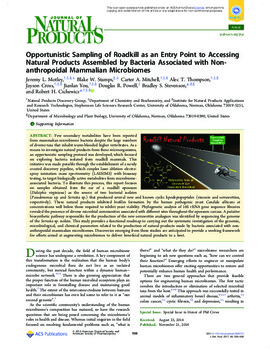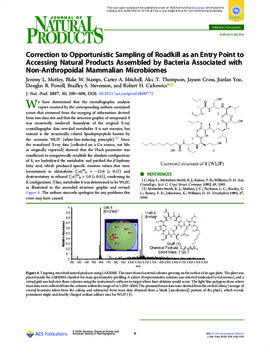| dc.contributor.author | Motley, Jeremy L. | |
| dc.contributor.author | Stamps, Blake W. | |
| dc.contributor.author | Mitchell, Carter A. | |
| dc.contributor.author | Thompson, Alec T. | |
| dc.contributor.author | Cross, Jayson | |
| dc.contributor.author | You, Jianlan | |
| dc.contributor.author | Powell, Douglas R. | |
| dc.contributor.author | Stevenson, Bradley S. | |
| dc.contributor.author | Cichewicz, Robert H. | |
| dc.date.accessioned | 2017-04-05T18:52:33Z | |
| dc.date.available | 2017-04-05T18:52:33Z | |
| dc.date.issued | 2016-11-21 | |
| dc.identifier.citation | Motley, J. L., Stamps, B. W., Mitchell, C. A., Thompson, A. T., Cross, J., You, J., Powell, D. R., Stevenson, B. S., Cichewicz, R. H. (2017). Opportunistic Sampling of Roadkill as an Entry Point to Accessing Natural Products Assembled by Bacteria Associated with Non-anthropoidal Mammalian Microbiomes. Journal of Natural Products, 80(3), 598-608. doi: 10.1021/acs.jnatprod.6b00772 | en_US |
| dc.identifier.uri | https://hdl.handle.net/11244/50421 | |
| dc.description.abstract | Few secondary metabolites have been reported from mammalian microbiome bacteria despite the large numbers of diverse taxa that inhabit warm-blooded higher vertebrates. As a means to investigate natural products from these microorganisms, an opportunistic sampling protocol was developed, which focused on exploring bacteria isolated from roadkill mammals. This initiative was made possible through the establishment of a newly created discovery pipeline, which couples laser ablation electrospray ionization mass spectrometry (LAESIMS) with bioassay testing, to target biologically active metabolites from microbiome-associated bacteria. To illustrate this process, this report focuses on samples obtained from the ear of a roadkill opossum (Dideiphis virginiana) as the source of two bacterial isolates (Pseudomonas sp. and Serratia sp.) that produced several new and known cyclic lipodepsipeptides (viscosin and serrawettins, respectively). These natural products inhibited biofilm formation by the human pathogenic yeast Candida albicans at concentrations well below those required to inhibit yeast viability. Phylogenetic analysis of 16S rRNA gene sequence libraries revealed the presence of diverse microbial communities associated with different sites throughout the opossum carcass. A putative biosynthetic pathway responsible for the production of the new serrawettin analogues was identified by sequencing the genome of the Serratia sp. isolate. This study provides a functional roadmap to carrying out the systematic investigation of the genomic, microbiological, and chemical parameters related to the production of natural products made by bacteria associated with non-anthropoidal mammalian microbiomes. Discoveries emerging from these studies are anticipated to provide a working framework for efforts aimed at augmenting microbiomes to deliver beneficial natural products to a host. | en_US |
| dc.description.sponsorship | Research reported in this publication was supported by the National Institutes of Health, National Institute of Allergy and Infectious Diseases (1R21AI101487) (R.H.C. and B.S.S.). X-ray data were collected by L. Thomas in the OU Macromolecular Crystallography Laboratory, which is supported, in part, by an Institutional Development Award from the National Institutes of Health, General Medical Sciences (P20GM103640). The C. albicans SC5314 culture was kindly provided by A. Dongari-Bagtzoglou, University of Connecticut Health Center. The LC-ESIMS instrument used for this project was funded in part by a Challenge Grant from the Office of the Vice President for Research, University of Oklahoma, Norman Campus, and an award through the Shimadzu Equipment Grant Program (R.H.C.). | en_US |
| dc.language | en_US | en_US |
| dc.rights | ACS AuthorChoice - This is an open access article published under an ACS AuthorChoice License, which permits copying and redistribution of the article or any adaptations for non-commercial purposes. | |
| dc.rights.uri | https://pubs.acs.org/page/policy/authorchoice_termsofuse.html | |
| dc.subject | Chemistry, Biochemistry. | en_US |
| dc.subject | Natural products | en_US |
| dc.subject | Mammalian microbiomes | en_US |
| dc.title | Opportunistic Sampling of Roadkill as an Entry Point to Accessing Natural Products Assembled by Bacteria Associated with Non-anthropoidal Mammalian Microbiomes | en_US |
| dc.type | Article | en_US |
| dc.description.peerreview | Yes | en_US |
| dc.identifier.doi | 10.1021/acs.jnatprod.6b00772 | en_US |
| dc.identifier.doi | 10.1021/acs.jnatprod.7b00234 | en_US |
| ou.group | College of Arts and Sciences::Department of Chemistry and Biochemistry | en_US |
| ou.group | College of Arts and Sciences::Department of Microbiology and Plant Biology | |

